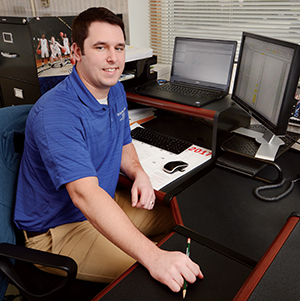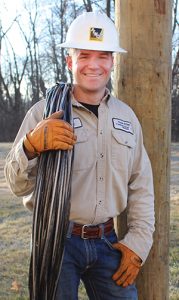 When Emily Howard finished college in the spring of 2012, like a lot of seniors she had no idea where life would take her. But she knew finding her niche may most likely mean leaving the small Marshall County community of Argos where she grew up.
When Emily Howard finished college in the spring of 2012, like a lot of seniors she had no idea where life would take her. But she knew finding her niche may most likely mean leaving the small Marshall County community of Argos where she grew up.
“I was pretty much up for whatever after graduation,” she recalled. “My plan was just to apply at a bunch of random places and see where it got me.”
Where it got her was right back where she started — in Marshall County. But that didn’t mean she settled for less. On the contrary, “What I learned throughout my college career,” she said, “fit perfectly with what I’m doing now.”
Her career interests were marketing, advertising and event planning for a non-profit organization. Today, as the communications specialist at Marshall County REMC, Howard, 27, handles marketing, advertising and event planning, … and the Plymouth-based REMC, like all electric cooperatives, is not-for-profit.
She was a few months into her job hunt when she learned of the opening. Her soon-to-be fiancé, Eric Howard (same last name, no family connection), had just graduated, too. He came home to enjoy the lifestyle he grew up in and loved in rural Plymouth and had already accepted a job in Warsaw, a 30-minute commute. So, she wanted to remain in Marshall County, but she was growing frustrated with the lack of prospects. Then she saw a newspaper ad for the position in Plymouth.

Growing up 10 minutes south of Marshall County REMC’s office in the town of Argos, Emily Howard must have driven by the co-op’s front doors on U.S. 31 a thousand times without giving it a thought. But after college, the open communications position there fit her interests and background perfectly, letting both her and her husband, who was from Plymouth, come home to rewarding careers and lives.
Photo by Richard G. Biever
“I had no idea where the opening was. All it said was ‘communications specialist,’ and then it had the description,” she said. “Based on the description, I thought I could do the job.”
Howard applied and was called to set up an interview. She said her first thought was, “‘What is REMC?’ I had to ask my dad.”
She did some research. As luck or perhaps providence would have it, Eric knew all about the REMC; his maternal grandparents had both served at different times on its board of directors.
Marshall County REMC CEO and president Mark Batman said he was more than surprised to find an applicant so qualified — and so close. “I was stunned at how well she fit our concept of what we were looking for. We had reviewed several résumés, conducted some interviews, but when we finished our first interview with Emily, my staff and I looked at each other in disbelief and decided to offer her the job right away before anyone else could snap her up. It was one of those rare management moments when the stars seemed to align.”
Howard started in October 2012. She and Eric married in June of 2014 and are expecting their first child this June.
Careers at the co-op
Indiana’s electric co-ops provide skilled trade and professional career opportunities for some 1,500 employees across the network of 38 local REMCs. Electric co-ops here and across the nation are recruiting and retaining talented people for jobs of all kinds. Over the next five years, electric cooperatives will be hiring nearly 15,000 employees nationwide.

Co-ops count on ‘Jacks & Jills of all trades’
Behind the power lines and the monthly electric bill you receive are many more people than just lineworkers and billing clerks. Your local electric co-op and its co-op business partners — on the state and national level — have an incredibly broad range of job titles and duties. Here is just a sampling:
Accounting/finance
Administrative/clerical
Advertising
Arborist/vegetation
management
Audio/visual
production
Billing
Communications
Community outreach
Computer
programming,
maintenance
Cyber security
Data acquisition/
analysis
Desktop publishing
Economic development
Educational services
Employee development
Energy advisor
Engineering
Environmental
management
Equipment operators
Government relations
Graphic design
Grassroots political
outreach
Human resources
Information technology
Legal services
Lineworkers
Mapping
Marketing
Mechanical
maintenance
Meeting/event
planning
Member services
Metering
Operations manager
Philanthropy
Photography
Power management
Public/corporate
relations
Purchasing/inventory
Regulatory compliance
Research/development
Right-of-way
maintenance
Safety/training
Secretarial
Social media
Technicians
Wildlife management
Website design/
management
Youth programs
coordinator
… (and all other duties
as assigned!)
Some of the hiring is in response to Baby Boomer retirements — electric co-ops expect nearly 10 percent of lineworkers and almost 18 percent of engineers and operations staff will retire over the next five years, reports the National Rural Electric Cooperative Association, the service organization for the nation’s more than 900 electric co-ops.
Despite competitive wages, excellent benefits, job stability and rewarding work, electric cooperatives and other energy companies often have a difficult time attracting new employees. One reason for this recruiting challenge is a lack of awareness among potential new hires.
A lineworker high atop a pole is the first image that comes to mind for most people who think about traditional electric co-op jobs. Lineworkers remain the backbone of the business and comprise the largest segment of the co-op workforce. Approximately 550 of Indiana’s co-op employees, or 36 percent, are linemen. But it takes a variety of talents to keep a co-op running smoothly.
Information technology and engineering are two rapidly growing career opportunities at co-ops. The need for more high-tech workers is driven by the shift to a smarter electric grid and the growth of renewable energy sources that must be carefully monitored and managed. IT experts also are increasingly important to safeguard the grid, data and other sensitive cyber assets.
Other in-demand career paths at electric cooperatives include finance, member services, equipment operators, energy advisors, communications and marketing, purchasing, administrative support and human resources. (Read how Indiana is stepping up to STEM challenges.)
Where the heart is
When Kyle Jobe attended his 10-year high school reunion last summer in Connersville, he didn’t have to travel far. Like Emily Howard, he’s back where he started.

After earning his bachelor’s and master’s degrees in accounting from Butler University and working for an accounting firm in Indianapolis, Kyle Jobe jumped at the offer to be the accountant at Whitewater Valley REMC in Liberty, Indiana. He and his wife came home to the eastern Indiana area they both grew up in to start their family. Their first child, a daughter, was born in February.
His closest friends from college are pursuing careers in San Diego, St. Louis, Chicago and Nashville. And, immediately out of college, Jobe had a job in Indianapolis. But both he and his wife, also from Connersville, had other plans.
“I always knew long term that is not where I wanted to be,” he said. “It’s nice to get to do some of the things in a larger city, but I also knew when I wanted to settle down, I’d rather do it in a small town.”
After earning bachelor’s and master’s degrees in accounting from Butler University in 2010 and 2011, Jobe went to work for London Witte Group, an accounting firm in Indianapolis. The firm performs accounting and auditing services for many of Indiana’s electric co-ops. But just two years into the job, the accounting position opened at Whitewater Valley REMC, headquartered in Liberty. He jumped at the chance.
In the interest of full disclosure, Jobe did have an inside connection to Whitewater Valley, which serves the Richmond/Connersville/Brookville areas of eastern Indiana. His dad’s twin brother, Terry Jobe, once held the same accounting position at Whitewater Valley before moving to neighboring RushShelby Energy where he eventually became CEO.
Kyle Jobe, now 29, interned at Whitewater Valley during college. When Whitewater Valley’s accountant, Mary Jo Thomas, moved from the accountant’s chair to the CEO’s office in 2013, she knew Jobe would be perfect for the position.
Jobe relished the chance to come home, where both he and his wife have large, close-knit extended families. Just last month, Jobe and his wife, Sydnee, added their first child to the family.
“Just about every weekend we have a family birthday party or something to attend,” he said. “I wanted to come back, but was never sure if there’d be jobs available. A lot of people my age either don’t really care if they go back to where they grew up, or were set against going back.
“I always had a different mindset,” Jobe said. “I really enjoyed where I grew up. I thought I had a great childhood, so if my kids get to have that same childhood, I’d be happy for them.”
While Jobe is focusing on accounting duties, adding new responsibilities wherever he can to keep things fresh and adjusting to life as the parent of a newborn, he nodded at the notion that the career track he’s on has produced more than one co-op CEO. “CFO or CEO, … I can see transitioning to that down the road,” he said.
From the front lines to power lines
Electric cooperatives have long been eager to hire military veterans who come home instilled with a work ethic and discipline needed for the most demanding co-op jobs like line work. Last year, America’s electric cooperatives launched a program to formally promote that practice.

Before becoming a lineman for Noble REMC, Zane Gray earned a degree from Ball State University and then served four years as an intelligence analyst in the U.S. Air Force. He and his wife, who was also in the Air Force, wanted to live near family in a smaller town and selected Indiana over her hometown in Idaho.
Photo by Kevin Dreibelbis/Noble REMC
“Serve Our Co-ops; Serve our Country” helps co-ops address the significant retirements projected in the coming years and significant changes in technical talent required to keep safe, affordable and reliable power flowing.
Zane Gray could be a military poster boy for the new program; he came to Noble REMC almost five years ago to fill an opening for a lineman. In the U.S. Air Force, Staff Sgt. Gray had been an intelligence analyst helping aircraft missions in Central and South America fly smoothly. Now, the 33-year-old Albion native helps keep the power flowing smoothly.
A 2002 high school graduate of Central Noble High School, Gray earned a college degree in 2007. But right after, he joined the Air Force.
While in training in Texas, he met his future wife, Danielle. After four years in the Air Force, most of it in Tucson, Arizona, both wanted out of the large city. “It got to be that we wanted to be closer to family,” he said.
They could choose either Indiana, or her home state of Idaho, near Boise. He said they both wanted to continue in some capacity with the Air Force; Indiana provided that opportunity. He served in the Air Force Reserve at Grissom Air Reserve Base, and Danielle took a full-time job with the Air National Guard in Fort Wayne.
The co-op lineage flows in Gray’s past. His great grandmother worked for Noble REMC, and his grandfather was a lineman there and retired as operations manager in 1999. His dad tests the equipment lineworkers use to make sure they meet OSHA standards for Noble and other REMCs around the state. “So it’s kind of in the family,” he said.
It also goes to show it’s never too late to follow the advice of elders. “My grandpa always said, ‘You should’ve gone to lineman’s school.’”
Gray eventually did. He graduated from the Indiana Electric Cooperatives’ Rural Electric Apprenticeship Program as a full-fledge lineman in January. Gray said he enjoys the work — being outdoors, its physical nature. Coming home was no issue for Gray. “I knew I could find work. I didn’t know if would like it,” he said. “But I couldn’t be happier.”
No place like home
Emily Howard, Kyle Jobe and Zane Gray followed different muses for career choices, but all ended up back at home — working for their local electric cooperative.
Contrary to the old proverb, the grass can be just as green on your side of the fence — in rural, small-town or suburban Indiana — if you know where to look.
Richard G. Biever is senior editor of Electric Consumer. This article incorporates some material from NRECA.
CLICK HERE to check out the list of job openings around Indiana.



